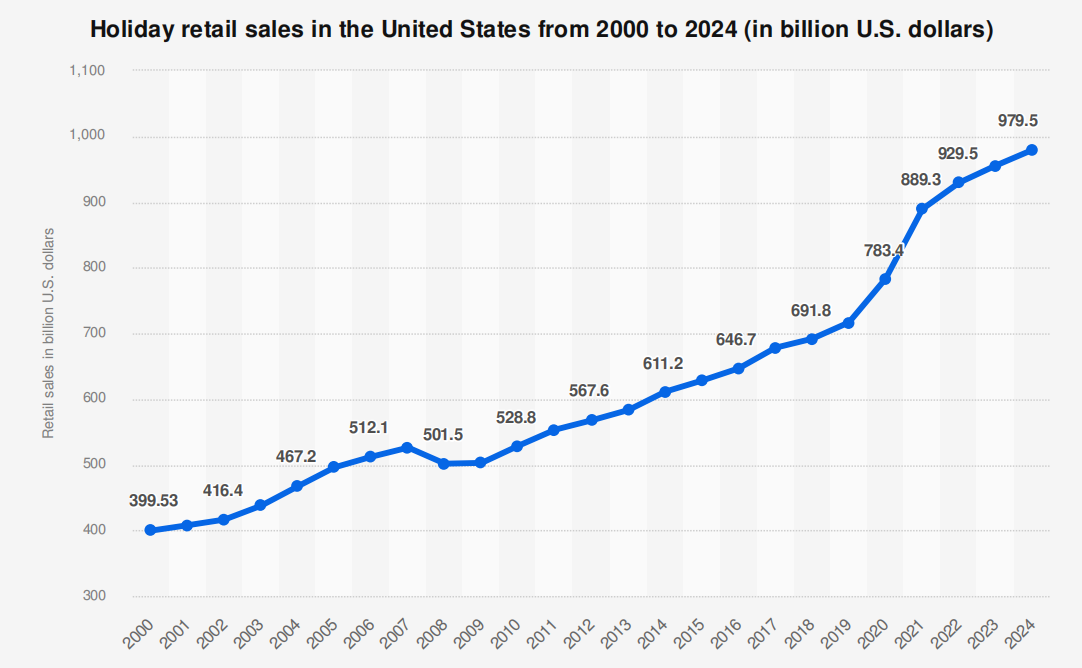For is millions, holiday sales are the time to start shopping!
We are well aware of the great deals that come with holiday sales, but there are some common questions that need to be understood and discussed, especially as we approach the winter season, and below, we've put together a guide to some of the holiday sales that have some common questions that you may be interested in.
Festive Winter Holiday Promotions
Winter holidays encompass a range of cultural, religious, and secular celebrations, while promotional holidays are often created or leveraged by businesses to boost sales.
They are primarily in November and December and include Christmas, Thanksgiving, Hanukkah, Kwanzaa, Boxing Day, etc. These promotional holidays are strategically timed to capitalize on consumer spending during the winter holiday season and often feature significant discounts and marketing campaigns.
US Retail E-Commerce Holiday Season Product Sales, 2024
By far, electronics will be the most profitable product category for retail e-commerce sales in the U.S. during the holiday season, with apparel being the second most profitable category.
Merchants who want to try new categories in the future can use this as a reference.
Winter Holiday Promotions Outlook 2024
The chart shows the trend of holiday retail sales in the United States from 2000 to 2024, measured in billion U.S. dollars.
There is a general upward trend in holiday retail sales over the years,sales increased from $399.53 billion in 2000 to an estimated $979.5 billion in 2024. Significant growth is observed in recent years, particularly from 2019 ($691.8 billion) to 2024.

Source: National Retail Federation
From this we can deduce that winter holiday sales will set a new record in 2024.
What makes up the winter holiday season in the United States?
The winter holiday season includes shopping occasions such as Thanksgiving weekend - which is made up of Black Friday, Small Business Saturday, and Cyber Monday, Super Saturday – the last Saturday before Christmas, and Christmas itself. Thanksgiving weekend is a very popular time for consumers to partake in holiday shopping. In 2022, over 100 million U.S. consumers shopped on Black Friday.
What businesses participate in winter holiday promotions
Walmart, Amazon, and Target are indeed key players in the holiday shopping landscape, capturing a significant portion of consumer attention and spending. With 52.8% of holiday shoppers planning to shop at Walmart, it remains a dominant force, likely due to its wide range of products and competitive pricing. Amazon, with 50.2% of shoppers, continues to leverage its vast online marketplace and convenient delivery options to attract consumers. Target, securing 34.1% of shoppers, appeals with its combination of in-store and online shopping experiences, as well as its curated product selection.
Beyond these three, other popular retailers include TJX, known for its off-price retailing strategy, attracting 22.8% of shoppers. Best Buy, with 17.3%, draws consumers looking for electronics and tech deals. Dollar General, appealing to budget-conscious shoppers, has 17% planning to shop there. These retailers collectively create a diverse and competitive shopping environment during the holiday season, catering to a wide range of consumer preferences and needs.
Why do retailers put holiday merchandise on the shelves so early?
Reducing the impact of logistical delays and a competitive marketplace has forced merchants to stock up on holiday merchandise and launch campaigns well in advance of the holiday season. Giving customers a taste of the holiday season will entice them to shop early.
Black Friday and Cyber Monday
The approaching Black Friday and Cyber Monday are eagerly awaited, as many new e-commerce platforms have emerged, and this year's deals seem to be bigger than ever, and we're all looking forward to benefiting from the sales frenzy.
We could see images of the Black Friday offline shopping frenzy spread across the web in previous years, but holiday shopping is becoming more and more focused online.
The trend of increasing spending during Black Friday and Cyber Monday has been consistent over the years, with 2024 continuing to set new records. Here's a summary of the spending patterns and key insights from recent years:
2023
- Black Friday: Shoppers spent $9.8 billion.
- Cyber Monday: Spending reached $12.4 billion.
- Trend: Despite sales starting earlier, consumers still spent heavily on these key days.
2022
- Black Friday: $9.12 billion in spending.
- Cyber Monday: $11.3 billion spent.
- Discounts: Cyber Monday electronic discounts peaked at 25%, encouraging strategic spending during Cyber Week.
2021
- Cyber Monday: $10.7 billion spent, a slight decrease from 2020.
- Overall Spending: From Nov. 1 to Nov. 29, online spending totaled $109.8 billion, an 11.9% increase from 2020.
- Supply Chain Impact: Early shopping due to supply chain challenges.
2020
- Black Friday: $9.03 billion in online sales.
- Thanksgiving: $5.1 billion spent.
- Pandemic Influence: A 19% increase in online sales compared to 2019.
2019
- Black Friday: $7.5 billion spent online.
- Thanksgiving: $4.4 billion in online sales.
- Growth: 20.2% increase over 2018.
2018
- Black Friday: $6.2 billion in online sales.
- Thanksgiving: $3.7 billion spent.
- Increase: 19.7% growth compared to 2017.
These patterns indicate a strong consumer appetite for deals and a continued reliance on online shopping platforms to meet holiday shopping needs.
Take direct and effective action to help you achieve effective results in your holiday shopping this year.
Host Live Shopping Events. This approach leverages the interactive nature of social media to create a dynamic shopping experience. By hosting live events on platforms like Instagram Live or TikTok, retailers can engage directly with their audience, demonstrate products in real-time, and offer exclusive deals that encourage immediate purchases. This not only drives sales but also builds a community around your brand, as customers can ask questions and receive instant feedback.
Implement AI-Driven Personalization. Personalization is key to enhancing the customer experience. By utilizing AI, retailers can analyze customer data to understand preferences and shopping behaviors. This allows for tailored product recommendations and personalized holiday messages, making each interaction feel unique and relevant. Such personalization can significantly increase customer satisfaction and loyalty, as shoppers feel more connected to the brand.
Create a Gamified Shopping Experience. Gamification adds an element of fun and engagement to the shopping process. By incorporating rewards, badges, or discounts for certain actions, retailers can motivate customers to interact more with their brand. This not only increases customer retention but also encourages behaviors that benefit the retailer, such as social media sharing or newsletter sign-ups.
Collaborate with Influencers for Pop-Up Experiences. Influencers have the power to reach wide audiences and create buzz. By partnering with them for pop-up experiences, whether online or in physical locations, retailers can tap into their followers and generate excitement. These events can be themed around holidays or special collections, offering a unique shopping experience that stands out from traditional retail.
Offer Subscription-Based Holiday Boxes. Subscription boxes cater to the growing demand for convenient and curated shopping solutions. By offering holiday-themed boxes, retailers can provide customers with a ready-made gift option that combines popular products with exclusive items. This not only simplifies the shopping process but also introduces customers to new products, potentially increasing future sales.









